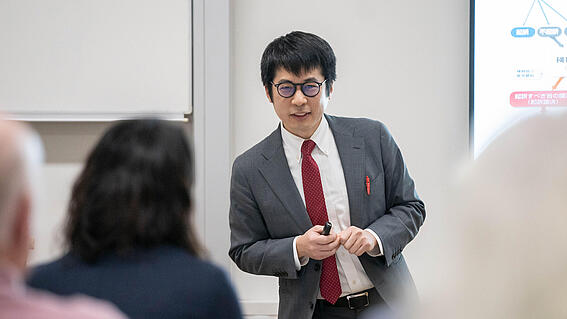At the invitation of Professor Dr. Karsten Gaede (Chair of Criminal Law II) and the Deutsch-Japanische Juristenvereinigung, DJJV (an association of German and Japanese lawyers), Professor Kazushige Doi, LL.M., Kitakyūshū University, gave a lecture on the proceeding to enforce criminal prosecution in Japan that particularly addressed the Fukushima disaster. About 50 guests participated in the event online and onsite.
SPEAKERS PROF. DOI UND PROF. NAITO
Professor Kazushige Doi and Professor Naito concluded their research visit to the Chair of Criminal Law II at Bucerius Law School with the lecture evening. Prof. Doi holds an LL.M. from Marburg, Germany, and is an assistant professor at Kitakyūshū University.
Currently, he is working on his dissertation on comparative law regarding criminal procedure, which he is writing under Professor Dr. Christoph Safferling at the Univ. of Erlangen-Nuremberg. Professor Naito from Kumamoto University has been a guest of Bucerius Law School several times. Currently, he is conducting comparative legal research on the scope of legal reservation in investigative interventions.
THE LECTURE
Following a greeting by the Honorary President of the DJJV, Dr. Jan Grotheer, retired President of the Hamburg Fiscal Court, Prof. Doi explained the Japanese system of the proceeding to enforce criminal prosecution through an investigative committee consisting of laypersons and advised by legal experts. First of all, he made it clear that in Japan, the public prosecutor's office has to fulfill high demands on grounds for suspicion, leading to a strong filtering out of cases in the run-up to the main hearing.
In the absence of an indictment, the aforementioned committee may adopt a decision in a multi-stage procedure to bring an indictment, particularly at the request of an injured party. In particular on the basis of the Fukushima case, where the indictment was based on a proceeding to enforce criminal prosecution, he explained this remarkable model of democratic control of the state's prosecutorial monopoly.
At the same time, Prof. Doi clarified the criticisms that object to the expansion of criminal prosecution with insufficient attention to the rights of the defense. Afterwards, Prof. Naito commented on Prof. Doi’s lecture. He, too, is favorable to the proceedings to enforce criminal prosecution by the investigative committee, but nevertheless pointed out unresolved problems regarding the rights of the accused. In addition, he critically emphasized that the Japanese system lacks protection against unsubstantiated charges by the public prosecutor's office, which might be a concern in some cases.
DISCUSSION REGARDING COMPARATIVE LAW
In the concluding discussion, the guests took the opportunity to exchange ideas with their Japanese colleagues. In particular, the differences arising from the Japanese party process were up for debate. Among other questions, the guests discussed whether a court or a trial judge could act in the Japanese model to control the prosecution's practice in order to avoid excessive indictment through the involvement of laypersons.
In the debate, Prof. Doi highlighted the fact that the investigative committee has not been held to the same standard required for an indictment as the public prosecutor so far, which has already been criticized in Japan.



